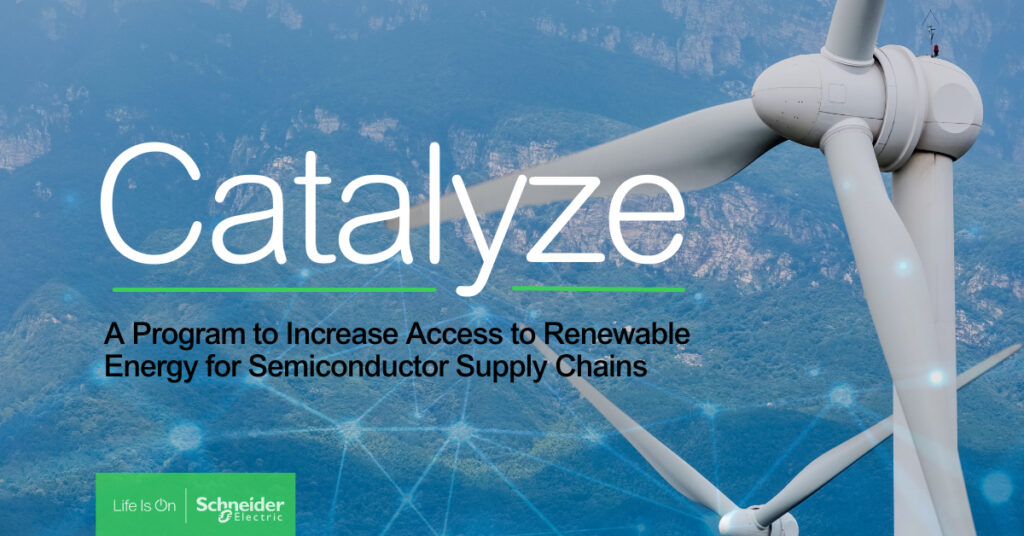ASIA ELECTRONICS INDUSTRYYOUR WINDOW TO SMART MANUFACTURING
New Partnership Aims to Decabornize IC Value Chain
Schneider Electric has launched Catalyze, a new partnership program aimed at accelerating access to renewable energy across the global semiconductor value chain. Particularly, the company unveiled the program at SEMICON West 2023.
As a background, Catalyze is a first-of-its kind program of collaboration among key semiconductor and technology industry leaders to address the supply chain emissions within their industry. The program joins other Schneider Electric supply chain partnership initiatives that seek to leverage the power of supply chain cohorts. This includes the Energize program for the pharmaceutical industry, and Walmart’s Gigaton PPA program.

Propels Decarbonization
Intel and Applied Materials, Inc. are the inaugural corporate sponsors of the Catalyze program. Together with Schneider Electric, the companies will encourage suppliers from throughout the semiconductor industry ecosystem to join the Catalyze program. Most importantly, to help accelerate the value chain’s transition to renewable energy and a low carbon future.
As the global demand for semiconductors in consumer and commercial products increases, the carbon footprint continues to grow. Thus, making it imperative for semiconductor industry leaders to collaborate to drive greater use of renewable energy and achieve a more sustainable path to growth. The shared goal of the Catalyze participants will be to encourage the industry’s thousands of suppliers to take bold climate action through decarbonization. Furthermore, this is a challenging task, due to the complexity of the value chain, data availability and reliability, and the difficulties in defining the boundaries of such emissions.
Catalyze Program Elements
The Catalyze program strives to achieve several goals. First, to combine energy purchasing power across the semiconductor value chain. Also, to accelerate the deployment of renewable energy projects.
Second, to provide suppliers – who may not have the capability on their own – with the opportunity to participate in the market for utility-scale power purchase agreements (PPAs). Next, is to increase awareness of the availability of renewable energy in specific global regions where the semiconductor value chain is operational. Thus, increasing greater adoption.
Another element is to continue to assist suppliers who have made commitments to reduce their carbon emissions and/or sign on to this program. Fifth, it also aims to educate companies in the semiconductor value chain about the importance of developing operational models to use in their supply chain programs. Thus, to close net-zero ambition gaps.
Moreover, the program also aims to engage thousands of suppliers simultaneously through digital technology platforms, to drive swift and measurable actions in their supply chain decarbonization.
Lastly, it aims to lead the way for the industry to drive definitive next steps. Sponsoring companies will collaborate on the development of the program. This includes identifying focus areas and suppliers – as well as encouraging other semiconductor companies to consider the program for their own value chains.
Partners for Sustainability
Peter Herweck, CEO of Schneider Electric, said, “At Schneider Electric, our purpose is to empower companies to make the most of our energy and resources, bringing progress and sustainability together for everyone. Our mission is to be a digital partner for Sustainability and Efficiency, and the Catalyze partnership program is an excellent example of how companies in key global industries can collaborate to accelerate decarbonization,” said.
“Switching to renewable energy is an important step to reduce greenhouse gas emissions. Intel has achieved 93 per cent renewable electricity in our global operations and remains committed to reaching 100 per cent by 2030,” said Intel’s Keyvan Esfarjani, Chief Global Operations Officer.
“Applied Materials has been working with our suppliers to instill sustainability best practices through our SuCCESS2030 initiative, and we are excited to build on our momentum with the Catalyze program,” said Gary Dickerson, President and CEO, Applied Materials. “Promoting closer collaboration across the value chain is key to accelerating carbon emissions reduction. We look forward to working with our partners to drive higher output of clean energy for the global semiconductor industry.” Finally, the program will initially focus on suppliers with energy load in specific markets in the semiconductor value chain where renewable energy is currently available. Thus, with the intention to expand globally where specific interest and renewable energy market opportunities align.




